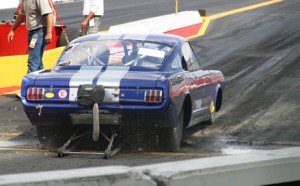News & what's on - Written by Barry & Richard on Sunday, December 6, 2015 11:42 - 0 Comments
Standard Bank failure to prevent bribery. The Aston Martin Bribery Act case. Or a hot rod?
 On the 1st July 2011 the debate was whether the Bribery Act would prove to be the UK’s Aston Martin equivalent to the FCPA or a cold war Trabant.
On the 1st July 2011 the debate was whether the Bribery Act would prove to be the UK’s Aston Martin equivalent to the FCPA or a cold war Trabant.
The Aston pictured could do from 0-60 in 8s and get up to a top speed of in excess of 140 mph. Today, a mini cooper can top this.
So. While the Bribery Act has been relatively slow to get going, last week it got some momentum and the comparison to an old Aston Martin was spot on.
We have touched on the admission provided by Sweett Group already.
In the SFO and Standard Bank PLC judgment, the first DPA to be put forward by the SFO for judicial agreement, Sir Brian Leveson gave judicial agreement to the terms negotiated between the SFO and the company, he also set out a myriad points to be examined further.
One point which is worth mentioning now is the speed with which the matter was Self Reported by Standard Bank to the SFO.
 Think Hot Rod with a heavy dose of Nitro Methane. A classic Aston this wasn’t.
Think Hot Rod with a heavy dose of Nitro Methane. A classic Aston this wasn’t.
Standard instructed the lawyers to report to the authorities within 24 hours and within a week had Self Reported to the SFO. Of course the Bank is a regulated entity in the UK and so there are other reporting obligations. But on any view this Aston Martin had been pimped. Under the bonnet (hood to our US readers) some serious tinkering has been going on.
The other notable point worth picking up on is the bar the Standard Bank imposes on those businesses who might seek a DPA and the fact that they won’t be for everyone. On the same day it was published Ben Morgan joint head of corruption at the SFO said this:
“We have been saying for some time that we thought the bar on cooperation would be a high one if it is to satisfy the court that a DPA is in the interests of justice, and, in this case at least, that appears to have been right…”
“…please don’t mistake our willingness to go down this route on this case for a desire to force a DPA onto every corporate case that we take on. In some, quite specific situations they will be appropriate, and we will always have in mind their possible use, but they are not the answer to everything. It is a high bar, for a DPA to be suitable, and where it is not met we have the appetite, stamina and resources to prosecute in the ordinary way.”
That said, following a self-report by the company the Director of the SFO found reasonable grounds to continue an investigation into their breach of Section 7 of the Act: the draft indictment, put before the judge for his consideration of the terms of the DPA set out a Section 7 offence, failure to prevent bribery.
The proposed terms of the DPA include the company:
“At its own expense, commissioning and submitting to an independent review its existing internal anti-bribery and corruption controls, policies and procedures regarding compliance with the Bribery act 2010”.
We understand that there will soon be other DPA’s put forward for final judicial consideration. The ‘Top 10’ of likely DPA’s did not include ‘Standard Bank’.
The Director of the SFO has repeatedly said that the Bribery Act will take time to be fully utilised.
The US FCPA history supports him. The corporate failure to prevent corruption offence is a powerful weapon in the hands of the DoJ who use it effectively: section 7 of the Bribery Act is now on the road, far from leaking oil it looks like a serious vehicle to drive corporate compliance forward.
Strap yourselves in.


